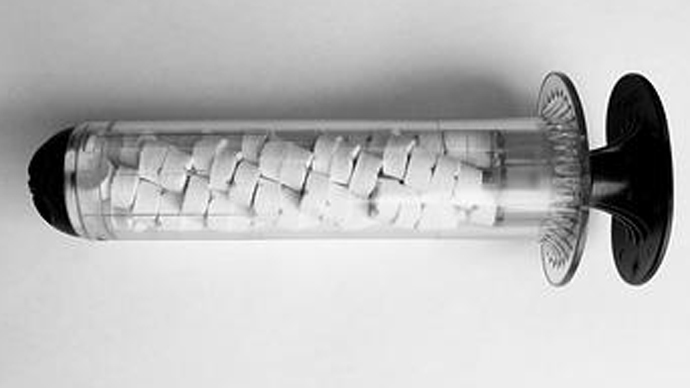A new battlefield lifesaver in the form of a syringe can seal a gunshot wound in just seconds. Supporters hope the ‘XStat’ will replace gauze, which army medics have used to treat life threatening war injuries for centuries.
The device was designed by US company RevMedx, which claims the apparatus can stop a wound from bleeding in just 15 seconds. The XStat is a modified syringe that injects tiny tablet-sized sponges into a wound. RevMedx says the device was inspired by the design of a standard emergency tire repair kit.
Its creators initially experimented by spraying foam into wounds,
John Steinbaugh, a US Army Special Operations medic who is on the
design team at RevMedx, told Popular Science.
“That’s what we pictured as the perfect solution: something
you could spray in, it would expand, and bleeding stops, But we
found that blood pressure is so high, blood would wash the foam
right out,” he said.
They then decided to use sponges measuring one centimeter in
diameter – the size of an aspirin or paracetamol tablet. Like the
foam, these sponges expanded to fill the wound. They also stuck
to moist surfaces and created enough pressure to stem the
bleeding.
“The core technology behind the XStat dressing is
mini-sponges that expand upon contact with blood – resulting in a
nearly immediate hemostatic effect without manual
compression,” a statement on the RevMedx website reads.
Using the Xstat on the battlefield, its makers say, is simple. A
medic would simply insert the syringe into a wound and press down
on the plunger to inject the miniature sponges.
RevMedx initially experimented on animal wounds. After early
success, the company managed to secure $5 million in funding from
the US Army.

The company then finessed its design to use sponges made from
wood pulp coated with a blood-clotting, antimicrobial substance
called chitosan. Each sponge is marked with a special ‘X’ that
shows up on X-rays to ensure that none of the tiny pills are left
in the body.
RevMedx is currently developing three different sizes of the
syringe to treat a variety of wounds. Each one is made of
lightweight polycarbonate and is expected to cost about $100. It
is currently awaiting approval from the Food and Drug
Administration (FDA) for use in the US.
Treating wounds on the battlefield is messy and difficult, and
the only way to stop a bleeding wound is by stuffing it with
gauze – often as deep as 12 centimeters into the body. Even then,
hemorrhaging can occur, requiring the gauze to be removed and new
material put in.
Uncontrolled bleeding is still the leading cause of death on the
battlefield and the second leading cause of death for civilian
traumas. However, most wounds are survivable.
According to a report published by the National Center for
Biotechnology Information, the highest percentage of survivable
battlefield deaths from 2001-2009 were from major trauma
hemorrhage.
“I spent the whole war on terror in the Middle East, so I
know what a medic needs when someone has been shot. I’ve treated
a lot of guys who would have benefitted from this product. That’s
what drives me,” Steinbaugh told Popular Science.

